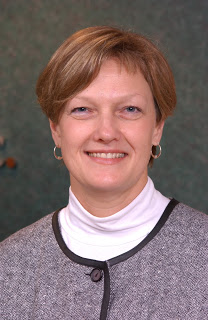Pat Alred, VP of Biosurgery at Johnson & Johnson

Pat Alred, VP of Biosurgery at Johnson & Johnson
#WiMHearHerStory | @WomeninMFG

At Women in Manufacturing, we are committed to supporting women in the manufacturing sector. We firmly believe that mentorship and community-building will help attract and retain women in manufacturing. As part of our mission, we feature on our blog the stories of women we admire who are currently working in manufacturing. The following is the latest installment of our "Hear Her Story" series.
Please tell our readers a little bit about your job and what your work looks like every day.
I am responsible for Ethicon Biosurgery’s supply chain, which makes products like Evicel and Evarrest. We have plants located throughout the world in Europe, Israel and China. Much of my day is spent talking to my teammates in Biosurgery and other key stakeholders about tactical, strategic actions and decisions. There are a lot of project reviews and updates that keep me informed and knowledgeable about how our business is performing. In addition, I often travel to visit our manufacturing sites and this is one of my favorite activities. I love to meet the people that work in the Biosurgery supply chain and understand their day to day accomplishments, challenges and how I can better support them.
How did you arrive at your current position? What attracted you to a career in manufacturing?
My professional career started in Process Development, working within the clinical organization to provide manufacturing processes for new products. From there, I moved into working on both clinical and commercial manufacturing processes, although within the development organization. I was intrigued with where our products went after clinical trials and what impact they had on patients. I felt that working within the manufacturing organization would put me much closer to the patient and also challenge me to learn new skills. So about five years ago, I moved into our Pharmaceutical Supply Chain as the General Manager of our Malvern site that makes Remicade. I joined the Biosurgery organization in 2014 as the Supply Chain leader.
At WiM, much of our work is dedicated to refuting outdated stereotypes about the manufacturing sector: stereotypes like the workplaces are dirty and dangerous and that the field and skills required are a better fit for men. Have you encountered stereotypes like these in your education or career and how did you overcome them?
Wow, that is a stereotype, as our plants are so clean they shine! Yes, I have certainly encountered stereotypes. Being blonde and southern, you can certainly imagine the teasing. In earnest, I think it is important we communicate openly about our work life, how we spend our days and start doing this at the high school level. Also, a picture is worth a thousand words. The videos we create of the manufacturing field would be wonderful to share with people as we discuss our careers. On the personal side you do your best, keep your sense of humor and in the end it is your ability to deliver business results that make for success, not your gender. While I have encountered stereotyping, much more often I have encountered support from all of my colleagues, including some outstanding supervisors willing to take the time to coach and mentor.
Research shows that women, especially women in STEM fields, do better if they have a mentor. Has mentorship played any role in your career?
Mentorship has definitely played a key role in my career. My first mentor was a college professor that hired me to do lab research at NASA, and then played a key role in my acceptance to graduate school in Sweden. I have had several mentors throughout my career since, and each of them has taught me something unique and valuable. One of the best gifts a mentor can bestow is teaching you how to look at something from a different viewpoint. For example, view something as a financial analyst rather than a scientist. This works to give you a broader view of the business and your impact.
One of the key findings in WiM’s survey is that there is significant overlap between what young women want in careers and the attributes of careers in manufacturing today. But the survey also found that, too often, young women are not aware of the opportunities available in manufacturing. What do you think can be done to spread the word to women about career options in modern manufacturing?
We can spread the word through job fairs, mentoring early in careers, hosting tours of manufacturing sites and showing videos on YouTube or Ted.
Our survey also found that the majority of women in manufacturing today would recommend the sector to young women considering career options. Would you recommend a career in manufacturing? And, if so, why?
I would absolutely recommend a career in manufacturing. It is so rewarding to know you are touching products that are going directly to a customer! And to know that these products make a difference in their lives, whether a life-saving drug or a baby lotion, you are touching thousands of people on a daily basis and to me this is all the reward needed. You have so many options within manufacturing – whether working on the floor, as a supervisor, in planning, purchasing, engineering, human resources…the opportunities and diversity of a career in manufacturing are endless and can grow with your career.
